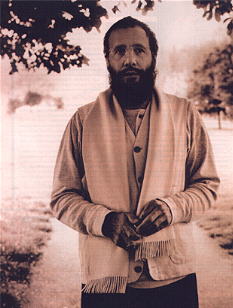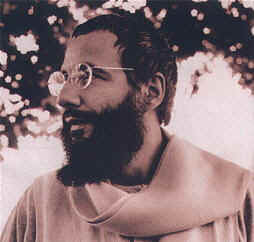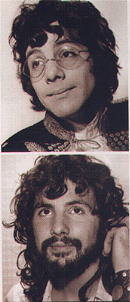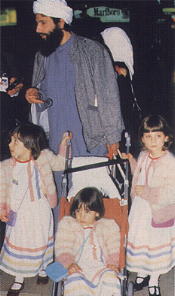Entertainment Weekly issue #544 June 9, 2000. This wonderful interview is courtesy of Jill
Mallow.
Respect Yusuf
By Chris
Willman

For the once
embattled Yusuf Islam (a.k.a the once conflicted CAT STEVENS), mourning has finally
broken.
CAT STEVENS IS SCANNING the
wall of St. Joseph’s Catholic Church in London, whose school he attended as a boy
some 45 years ago. He’s searching among the thousands of names tha students have
scratched into the bricks, looking for the spot where he etched his own name, which was
then Steven Demetre Georgiou. It’s a fruitless search; too many knife-wielding lads
have come and gone. Suddenly, he brightens, pointing to a sign. "See, they’ve
put my name up there: Cat Holic!"
Ba-da-dum. This is Cat
Stevens the nominal jokester, the easygoing man-about-London, and almost certainly not the
Cat Stevens you’d expect, which is to say, a dour, fatwa-happy zealot.
He's now neither Georgiou
nor Stevens but, of course, Yusuf Islam, and for most Westerners, being Muslim isn't
exactly synonymous with levity, even before the media have lumped a fellah together with
the Ayatollah. Yet the 52-year-old figure before us chuckles easily and often. If
anything, he's more jocular than in those pop-star salad days when he was mining gold out
of personal misery, enjoying international success with indelible early-'70s hits like
"Wild World," "Peace Train," and "Morning Has Broken" but,
true to the cliche, finding it lonely at the top. Listen back to his more torturously
soul-searching album tracks or read his vintage interviews and you may even discover that,
much more than Yusuf Islam, Cat Stevens could be kind of a drag.
"I didn't know what to
smile about," he says of those spiritually unfulfilling years. "I was confused.
I don't know where my humor came from, but it arrived one day... That was one of the
shocks that I experienced when I read the Koran. Up until that point, I'd felt like, well,
nothing is as perfect as I am." Another laugh. "You know, Greek ego. But when I
started reading those words, I realized that ... hey, there is something perfect, and
that's God. And he knows how weak we are, and we just have to submit.... That's when I
began to realize that I could look back and laugh at myself.'
His fans weren't laughing
when Stevens seemingly abandoned them for Allah. He'd promised his life to God in 1975,
after nearly drowning off the coast of Malibu. In 1977, he made a full conversion to the
Islamic faith after reading a copy of the Koran his brother had given him. He'd decided to
quit music for good by the time he released what he knew would be his secular swan song, Back
to Earth, in 1978. Soon after, Yusuf Islam put his musical instruments and gold
records up for auction and seemed to disappear off the face of that same earth. He
somewhat reluctantly reentered the U.S. limelight in 1989, after DJs banned his records
and old friends shook their heads amid reports he'd supposedly endorsed the death sentence
Islamic fundamentalists had levied against novelist Salman Rushdie for the alleged
blasphemy of The Satanic Verses. Feeling burned by that brouhaha, he's rarely granted
interviews since.
Now, for the first time
since the '70s, he's attempting to reopen lines of communication with his old audience,
Though he had little to no involvement with previous hits packages, Islam is cheerfully
promoting the just-released The Very Best of Cat Stevens, his first really comprehensive
retrospective CD, along with digital remasters of all his A&M albums. Why the sudden
enthusiasm? For starters, there are the royalties the oldies bring in for the educational
and refugee-relief charities he runs. It's also an opportunity to plug A Is for Allah, a
new CD/book combo he put together to educate children in the ways of the Koran, which
contains a bit of a cappella music amid its poetic spoken-word dogma. But there's also the
fairly recent realization that maybe he wasn't such a bad Cat after all.
 Walking away
from St. Joseph’s – and the playground that inspired his final hit, 1977’s
"(Remember the Days of the) Old Schoolyard" – Islam laments his previous
reluctance to publicly express himself. "A lot of people felt when I became a Muslim
that I’d turned my back. But what I was trying to do was live up to the moral
objectives which I’d set for myself, which a lot of my songs were about. You
can’t keep on singing. At some point you’ve got to do it… My big
mistake was not being able to communicate clearly my reasons and my rationale… I was
floating on a colud and didn’t know how to get people to float on the cloud with
me." Walking away
from St. Joseph’s – and the playground that inspired his final hit, 1977’s
"(Remember the Days of the) Old Schoolyard" – Islam laments his previous
reluctance to publicly express himself. "A lot of people felt when I became a Muslim
that I’d turned my back. But what I was trying to do was live up to the moral
objectives which I’d set for myself, which a lot of my songs were about. You
can’t keep on singing. At some point you’ve got to do it… My big
mistake was not being able to communicate clearly my reasons and my rationale… I was
floating on a colud and didn’t know how to get people to float on the cloud with
me."
Though he never completely
believed his old records were blasphemous, some more conservative Muslim leaders tried to
steer him toward a renunciation. "I went through various attitudes toward my music.
The first was almost nonchalance; I’d found something much more precious. Then,
later, I was being advised that some things I’d done in the past were to be forgotten
and sort of buried. But after studying the issue, I found there’s no explicit
statement in the Koran which tells you one way or the other about music. It does talk
about the condition of a man’s life, so you have to measure what music does to a
person."
And this is how Yusuf Islam
forged a truce with that ‘70’s guy: by realizing that Cat Stevens’ folk-pop
anthems were nourishing, even if they were mere snacks compared with a good
recitation from the Koran. "Recently I heard of someone who was on the point of
suicide, and they started playing my music and became optimistic again. If you take a song
like ‘Moonshadow,’ there’s a strong message that says, no matter what
condition you’re in, there’s a bright side to it." Also, he says,
"many of the songs, in a way, are mini-predictions" of his ultimate path.
"Looking back at my words, I saw I was actually a Muslim even before I embraced Islam
– I just had to be uncovered."
He pauses and scratches his
salt-and-pepper head. "I'm not saying all my songs are like that. There's a
song called 'Boy With the Moon & Star on His Head', about a guy who's just about to
get married, has an affair on the way, and then finds a baby left on his doorstep." A
rueful laugh. "I can't whitewash them all!"
We walked past the west end
flat he shared with his parents until his early 20s. Though separated, Mom and Dad lived
under the same roof. He doesn't mind waxing Freudian: "A psychologist could possibly
look into this thing and say, 'Well, his mother and father were apart, therefore he needed
safeguard in his life. For sure, I was looking for parents. And spiritual parents are not
that easy to find."
Nearby is the Shaftesbury
Theatre, where young Georgiou was a fixture at the stage door, absorbing the sounds of
musicals. He got sidetracked from plans to indulge in both theater and art by the rock of
swingin' London. The Very Best of opens with his first hit, 1960s "Matthew
& Son"- so wonderfully dated, it might've been written for Austin Powers III.
It was after this success as a Carnaby Street-dressed dandy that he was had up with
tuberculosis. When he got well, he ignored his agents' advice, abandoned his frilly
shirts, and reinvented himself with Mona Bone Jakon, which had a more earnest, primarily
acoustic "organic setting-and that's when I started growing my beard. Because only
organic people grow beards, you know!"
Tea for the Tillerman,
Teaser and the Firecat, and Catch Bull at Four – all from a remarkably fecund 1970-72
-- cemented his place in the hit parade. But he began to alienate his folk-loving fans
with overproduced and arguably more pretentious fare in the mid '70s. Curiously, its the
later work -- especially Back to Earth -- he's most proud of. Tillerman represented
"a simplistic, minimalist era, which I admit is very attractive. But as a musician
... you tend to give more credence to those things you spend more time on," he
explains, almost apologetically, "and I spent a lot of time on those last albums....
You say, 'I did "Father and Son" in two takes, but this one took me a
year!’ Of course, such preferences soon became moot – after converting, he made
music only till his contractual obligations were fulfilled. He finally withdrew from
public life to marry, raise five children, and devote time and royalties to his Muslim and
children's charities. When the Satanic Verses contretemps put him back in the papers, the
reaction was swift: DJs didn't just boycott his records, they steamrollered them; 10,000
Maniacs dropped its cover of "Peace Train" from their In My Tribe album, lest it
inspire 10,000 maniacs.
In fact, Islam is hardly
militant. At the height of the scandal, he was quoted as telling a group of students,
"he Koran makes it clear, if someone defames the Prophet, then he must die" --
which he maintains was mere reiteration of scriptural principle, harsh sounding as it may
be, not a literal call to action. The subsequent backlash "hurt quite a lot," he
says, "because that whole episode was taken quite out of context" due to
"elements within the press who really have no loyalty to anybody except a good
headline.... If you were to ask somebody, ‘What does the Bible say about adultery?'
they would have to quote chapter and verse -- that's the honest thing to do. And you'd
find bits in the Bible that say you should stone the person. Now, that means the President
of the United States is eligible for stoning. That doesn’t mean anybody's gonna do
that!"
Perhaps he missed some of
our Senate hearings. In any case, he frets, "things which are very important are not
discussed, and other things are sensationalized. Let's face it, we believe in angels.
We're serious! And that, I would say, is more important than anything to do with those sensational
headlines. But how many people are interested to talk about angels? I'm willing to if you
are," Islam chuckles, "but not many are." sensational
headlines. But how many people are interested to talk about angels? I'm willing to if you
are," Islam chuckles, "but not many are."
For now, it's enough to be
talking again about Cat Stevens, which Islam seems to find a hoot, even if-feeling that
lecturing and philanthropy are worthier callings, and unwilling to offend conservative
clerics-he has no plans to pick up a guitar again. We climb into his sports-utility
vehicle, and 'Wild World" comes on the cassette player.
Driving home, he hastens to
point out a line that doesn't jibe with his current beliefs: It’s hard to get by
just upon a smile. "Mind you, I've changed my opinion about smiles," he
says. "I think smiles are very important." Spoken like a true zealot.
(Three For The
Tillerman, Yusuf Islam, with daughters Asmaa,Maymanah, and Hasana in 1986.) |